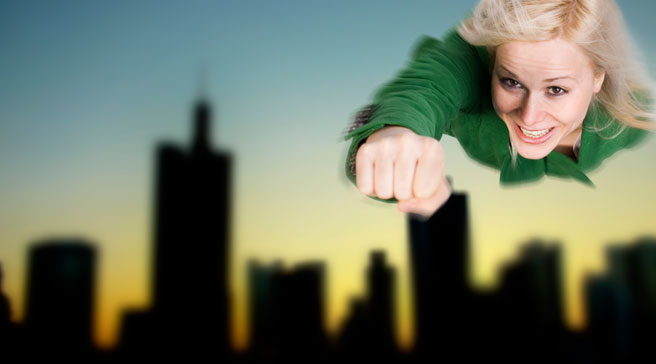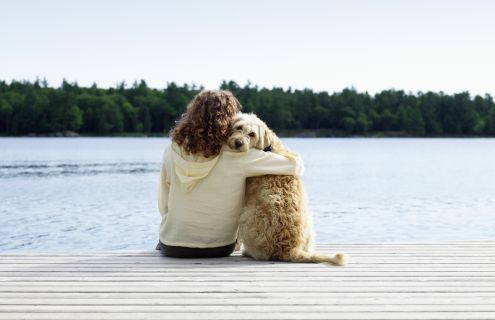You can be a hero
Real heroes don’t live in comic books. And with practice, say psychologists, anybody can be one… By Amelia Hill

Anne Charvonia doesn’t think of herself as a hero, or brave. ‘I just tend to speak before I think,’ she says. In 2009, she had stopped in a local newsagents on her way home from work, when a boy in his mid-teens ran in, clearly distressed. He’d just been mugged. ‘He asked the newsagent if he could use his phone to call the police, then another boy ran into the shop – the mugger’s friend. He started hassling the first boy, telling him not to call the police; if he didn’t, his friend would apologise.’
Most of the other customers in the shop looked on and said nothing, but Anne felt furious. ‘I thought, why should these boys be allowed to get away with it? Is no one going to say anything? I shouted at the second boy, “You don’t just apologise. That doesn’t make it OK”.’ The mugger’s friend ran away, and the boy called the police.
What she did, she insists, was nothing. The mugging had already taken place, all she did was stand up for a young boy. But no one else in that shop intervened.
We all know someone like Charvonia – we may even have faced the same sort of dilemma ourselves. But do you know what you’d have done in the same situation? Faced with shocking news stories – such as the death of Richard Whelan, who was stabbed when he stopped a man throwing chips at his girlfriend on a bus – it often feels like the right thing to do is say nothing and walk away.
But according to a growing number of psychologists, there is an imperative on all of us to be courageous. Not just because it makes for a better society, but because it’s good for us. ‘Fostering a clear idea of a personal heroic ideal can help guide a person in times of trouble, or moral uncertainty,’ says Philip Zimbardo, professor emeritus of psychology at Stanford University and author of The Lucifer Effect.
As creator of the Stanford Prison experiment (in which students instructed to act as guards in a fake prison became shockingly sadistic towards fellow student ‘prisoners’), Zimbardo was one of those groundbreaking researchers who revealed how we really think when confronted with a choice between bravery and inaction. Now, he firmly believes looking for chances to be heroic could have a positive effect on wellbeing. ‘Being able to react heroically, instinctively or spontaneously suggests an internal strength and self-assurance guiding the individual’s moral compass,’ he says.
Heroes-in-waiting
It’s an idea Zimbardo is now actively promoting, with the development of the Heroic Imagination Project. Dedicated to creating ‘a global movement of everyday heroism’, the project’s website lists inspirational resources on compassion, empathy, courage and ‘the helper’s high’ (the euphoria we feel when we engage in altruistic behaviour). The fledgling movement proudly reports it has more than 800 global ‘heroes-in-waiting’.
In the UK, Sgt Gary Brown of the Lincolnshire police created the Knight School for local six- to 16-year-olds in Spilsby. ‘Knight School is designed for young people, inspiring them to live ethical, purposeful, happy lives,’ says Brown. ‘We examine our principles and character, look at what is right and wrong, and how we know the difference.’ Within three years of its inception, public-order offences in the town fell by 70 per cent. So far, so inspirational… if you happen to be eight years old. In the past few decades, the antihero has been the more sophisticated option for disaffected Generation X-ers.
But, argues Professor Angie Hobbs of the University of Warwick, heroism still performs an essential function for adults, particularly when we’re feeling disillusioned by public figures (MPs’ expenses and bankers, anyone?). As senior fellow in the public understanding of philosophy, Hobbs is researching a book with the working title 'Heroism, Courage And Fame'. ‘We still have the same vital need as our forefathers for special people to do special deeds,’ she says. ‘That’s why we are still intensely moved by tales of heroic, everyday actions. These are virtues that are necessary for society to make us feel life is worth living.’
The banality of heroism
So what’s stopping us all striving to be modern-day heroes? Partly, says Hobbs, it is because we have dumbed down the definition of what a true hero is to the point we no longer know what to strive for. Teaching children about the Knights of the Round Table is all very well, but where should a woman in her forties look for inspiration? ‘The concept is not outmoded but the word has been debased,’ says Hobbs. ‘For many, heroes are no longer those who do great things at considerable personal risk. Instead, being a celebrity is enough, or a positive role model or a powerful sports figure.’
Others, however, point to the opposite problem. They suggest our traditional societal heroes (Nelson Mandela, Aung San Suu Kyi, Mother Teresa) are the wrong heroes precisely because they are the exceptions. In teaching our kids that these exceptional people encapsulate the word ‘hero’, we are teaching them the heroic act is unusual, remote and extraordinary. That, says Dr Julian Baggini, co-founder and editor of The Philosophers’ Magazine, is more damaging than helpful.
‘We conflate hero with superhero, thereby implying heroes are such super-special people their bravery is beyond anything that could be expected of the rest of us,’ he says. ‘In these circumstances, it is easy to fall into the trap of inaction – also known as the bystander effect – and assume it is beyond our abilities to be heroic; that it is someone else’s responsibility to act the hero.’
But by conceiving of heroism as a universal attribute of human nature, not just as a rare feature of the ‘heroic elect’, heroism becomes something that seems within the realm possibility for every person, says Zeno Franco, a colleague of Zimbardo’s based at the Pacific Graduate School of Psychology in California. ‘This “banality of heroism” concept suggests we are all potential heroes waiting for a moment in life to perform a heroic deed,’ he says.
Cultivating courage
So, can heroism be taught? Yes, say Zimbardo and Franco. The key is to develop our ‘heroic imagination’, to envisage how we might act in the heat of a dangerous moment, what dilemmas we might face, and how we would deal with them.
By setting ourselves small challenges, we can cultivate a personal habit of bravery, which equips us for facing the real thing.
Part of this strategy involves learning to develop our ‘discontinuity detectors’, an awareness of when something is wrong regardless of what the law or those around us are saying. Crucially, we must also learn to ignore the social anxiety we might feel if we stand firm.
It’s a habit Ellie, 32, wishes she’d had seven years ago. ‘I was on the last train home one Friday when a drunk couple got on, arguing,’ she says. ‘Suddenly he began hitting her really hard, slapping her around the face and shouting at her. I wasn’t the closest to them, so I hesitated to jump up, but then no one else did, and I felt as if I’d lost the moment and was trapped in my seat. I just sat there and pretended I couldn’t see them. When I got off the train I felt such a coward. I was angry with myself and everyone else on that carriage. Why hadn’t we done anything?’
‘Our society needs to consider ways of fostering heroic imagination in all its citizens, particularly in our young,’ urges Zimbardo. ‘We must teach them the seduction of evil will probably be quite ordinary – an unethical colleague or friend, for instance. The call might only come once in your life, and if you pass it by, you’ll always know, “I could have been a hero… and I let it pass me by”.’
How to nurture a heroic imagination
• Maintain constant vigilance for situations that require heroic action.
• Learn not to fear conflict because you took a stand.
• Imagine alternative future scenarios.
• Resist the urge to rationalise and justify inaction.
• Trust people will appreciate heroic (and frequently unpopular) actions.









